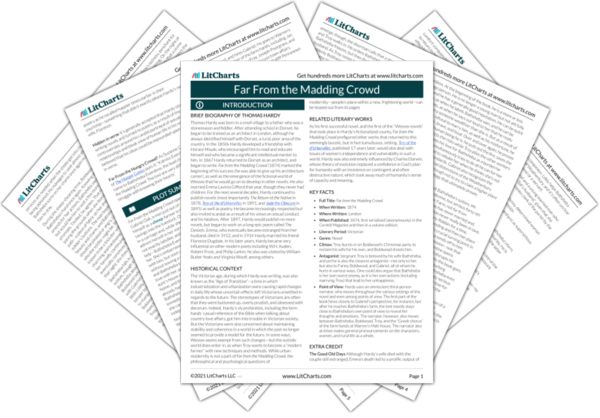Summary
Analysis
For the first time since his great misfortune, Gabriel feels independent and happier, though he remains attached to Bathsheba. It’s June 1st and still sheep-shearing season: the landscape is green and full of ferns and blooming plants. Coggan, Fray, Laban Tall, Poorgrass, Cain, and Gabriel are all in the Shearing Barn. Like a church or castle, this barn is still used for the purpose for which it was built. A sense of continuity and history (four centuries) pervades it, and its creed continues to be valid.
Gabriel has learned a great deal from suffering from forces outside his control: having been rendered penniless, he’s now managed to climb his way back up to an economic position of greater stability. The shearing barn is another example of the relative stability and continuity of Wessex, which seems to remain untouched by modernization.
Themes
The shearers kneel by the open side doors over a panting captive sheep. It’s a picture of today in a 400-year-old frame: Weatherbury is unchangeable compared to cities, where a period of ten or twenty years counts as old. The shearers, then, are in harmony with their shelter. In the background, Mary-ann Money and Temperance and Soberness Miller are twisting the fleeces into wool. Behind them all is Bathsheba, watching carefully.
The changing circumstances of the villagers and the dramatic events that take place within Weatherbury coexist, and contrast, with the unchanging elements of the landscape and the area. This scene is calm and bucolic, but that tranquility is also a trap that prevents one from seeing the conflicts within such stability.
Themes
Bathsheba watches Gabriel lop off the fleece of a sheep and, seeing its flush, murmurs that the sheep is blushing at the insult. Gabriel is silently content that Bathsheba is watching him, but not overly so—he doesn’t even wish to talk to her. Bathsheba’s chatter, though, says nothing; Gabriel’s silence says more.
Bathsheba and Gabriel are developing a close friendship even if their relationship is inevitably marred both by their common history and by the social gulf that now divides them.
Themes
Literary Devices
Gabriel calls for Cainy, who runs forward with the tar-pot to stamp “B.E.” onto the shorn skin. Mary-ann carries the fleece back, 3 ½ pounds of warmth for unknown people far away, though they’ll never feel the comfort of the pure, new wool here.
We’re reminded, here, that the country may be simpler and more static than the city, but is often a source of urban comfort, which requires hard labor and close attention.
Themes
Get the entire Madding Crowd LitChart as a printable PDF.

But Gabriel’s contentment is interrupted by the appearance of Farmer Boldwood, who crosses towards Bathsheba. They speak in low tones, inaudible to Gabriel, though he imagines it’s not about the sheep. Embarrassed, Bathsheba looks at the ground, growing redder and redder. Sadly, Gabriel continues to work.
Here we see this scene from Gabriel’s rather than Bathsheba’s point of view. Through his ability to closely analyze everything around him, as well as his familiarity with Bathsheba’s character, he is able to see and judge the nature of this courtship.
Themes
Bathsheba leaves Boldwood and then reappears 15 minutes later in a new riding habit: she and Boldwood ride off. As Gabriel watches them, he accidentally snips the sheep in the groin: Bathsheba notices the blood, and reprimands Gabriel for his carelessness. Gabriel knows Bathsheba is aware that she’s the cause of it, but he steels himself in resolve and says nothing. Bathsheba says she’s going to see Boldwood’s Leicesters (a sheep breed) and tells Gabriel to keep a watch over everything while she’s gone.
Gabriel is usually able to recede into the background so that his own observing goes unnoticed, but here his evident interest in Bathsheba’s and Boldwood’s affairs catches him out. Gabriel also recognizes that Bathsheba’s pride prevents her from acknowledging her influence over him, even though she can sometimes invite such influence.
Themes
Temperance Miller, Coggan, and Laban Tall conclude that this means marriage. Henery Fray says that such a bold lady with her own home has no need for a husband. Fray often objects to such determined women as Bathsheba: now he remarks that he once gave her advice, and she couldn’t care less. He even thinks Boldwood probably kissed her at the sheep-washing the other day. Gabriel says that’s false, but Fray insists that he can see where others can’t.
The group of farm hands is never wary of paying close attention to other people’s affairs, especially when it concerns their mistress Bathsheba. Fray in particular is once again the most traditional and most vehemently opposed to a woman’s independence and authority over him.
Themes
Mary-ann, who in her brown complexion looks like a Nicholas Poussin sketch, asks the party if anyone knows of a second-hand fellow who might like her. Gabriel remains silent, however: his good mood has gone away. Bathsheba had hinted she might give him the post of bailiff. Now he realizes he was mistaken in lecturing her: he had thought she was trifling with Boldwood, but really she was trifling with him.
The narrator elevates Mary-ann to the status of a world-famous painter, before juxtaposing that characterization awkwardly with her sighs about her comparatively dismal love life. Gabriel doesn’t chatter like the others, but Bathsheba has wounded him as well.
Themes












